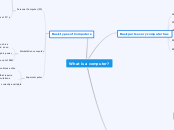Sources
http://www.computerhope.com/jargon/c/cpu.htm
https://www.cs.cmu.edu/~fgandon/lecture/uk1999/computers_types/
http://www.ultrabookreview.com/2796-ultrabook-definition/
http://www.partesdeunacomputadora.net/
What is a computer?
Capable of
Sources:
https://www.cs.cmu.edu/~fgandon/lecture/uk1999/computers_types/
https://www.google.com.ar/webhp?sourceid=chrome-instant&rlz=1C1GPEA_enAR377&ion=1&espv=2&ie=UTF-8&safe=active&ssui=on#q=what+is+a+computer&safe=active&ssui=on&*
PD: Wasn´t able to use the option of Insert Link
Producing signals or information
Performing operations according to procedural instructions (program)
Recieving data in a particular form
Basic types of Computers
Supercomputer
Fastest computers currently available
Employed for specialized applications that require immense amounts of mathematical calculations
Use enormous amount of space, sometimes entire rooms
Workstation computer
Relatively large amount of RAM
High graphic power
Used for engineering applications (CAD/CAM) such as desktop publishing, software development, and so on
Personal Computer (PC)
Basic types of PC´s
Ultrabooks
Small computer built to offer the same or more power than laptops, but in a thinner format
Notebook
Smaller than Laptops, but bigger and more powerful than Netbooks
Netbook
Smaller and less powerful than laptops
Laptop
Portable, battery powered computer
Desktop
Built to stay on a table with a monitor, mouse and keyboard hooked to it
Small, relatively inexpensive computer designed for an individual user
Entire CPU build in one chip
Basic parts every computer has
RAM Memory
Stores smaller amounts of information than ROM that is used to multitask and disappears when the computer is turned off
ROM Memory
Stores downloaded multimedia that stays saved even when the computer is turned off
GPU
Graphical Processor Unit used to process heavy graphical information
CPU
Central Processor Unit used to process numbers depending on the software. Brains of the computer
Casing
Part used to store all the components of the computer

